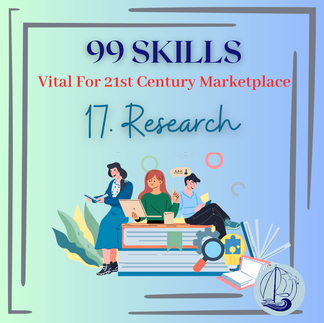99 Skills of 21st Century Market Place : Week 6
- Johnson Odakkal, PhD, CEO

- Mar 23, 2023
- 6 min read
#JOI's series on 99 essential skills for success in the marketplace continues to add value to you. This week let us focus on another three crucial skills that are key to making a lasting impression in your field. These are Conflict Resolution, Research, and Rapport Building. At a first glance these skills may seem disconnected, but they play an important role in achieving success in today's rapidly changing business environment. Whether you're mediating challenging situations, conducting extensive research, or building strong relationships with clients or colleagues, these skills are fundamental to your professional growth. In this post, we will delve into each of these skills, highlighting their importance and sharing effective strategies for developing them to their fullest potential.

16. Conflict Resolution
A Quote :
"The quality of our lives depends not on whether or not we have conflicts, but on how we respond to them." ~ Thomas Crum
An Example :
In a large corporation, two team leaders, John and Lisa, were assigned to work together on a project, but they had a history of conflict. They had worked together on a previous project, and there was a disagreement over the allocation of resources that had led to tension between them. As the project progressed, John and Lisa's communication became increasingly strained, and it became clear that the tension was affecting their ability to work together effectively. The project manager noticed the tension and decided to intervene.
The project manager used conflict resolution skills to facilitate a meeting between John and Lisa. The project manager created a safe space for John and Lisa to air their grievances and worked to ensure that both parties felt heard and understood. Through active listening and open communication, the project manager helped John and Lisa identify the root cause of their conflict - a lack of clear communication and expectations. The project manager then helped them come up with a clear plan for communication and collaboration moving forward.
As a result of the conflict resolution intervention, John and Lisa's relationship improved significantly. They were able to work together effectively, and the project was completed on time and within budget. The success of the project led to increased business opportunities for the corporation, and it highlighted the importance of conflict resolution skills in a corporate environment.
A Definition : Conflict resolution is the informal or formal process that two or more parties use to find a peaceful solution to their dispute. It involves recognizing that all parties have biased fairness perceptions, understanding the cognitive and emotional traps that can exacerbate conflict, and using strategies such as stress relief, emotional awareness, and communication to resolve the conflict.
A Checklist :
Listen Actively - Work to truly understand both parties involved in the conflict.
Remain Neutral - Put aside any personal biases and work objectively to find a resolution.
Identify Common Ground - Brainstorm solutions together that can address the needs of all involved.
Create a Collaborative Solution - Work together to create a viable option to the conflict.
Assess Risk and Impacts - Make sure to weigh the risks and impacts of any solution.
17. Research
A Quote :
"Research is formalised curiosity. It is poking and prying with a purpose." ~ Zora Neale Hurston
An Example :
Madhavi was a young, up-and-coming business professional working at a growing company. Although her peers recognised her talent, Laura had a tendency to struggle with the research required for her job. One day, her supervisor asked Madhavi to work on her research skills if she wanted to progress in her career. Madhavi knew he was right and promised to take the necessary steps to become better at research.
Over the next few weeks, Madhavi made a habit of dedicating a few hours every day to diligently studying and participating in online discussion groups. With newfound confidence, Madhavi set to work. She thought carefully about what resources she needed and what types of questions she should ask. Her efforts paid off and soon she was producing accurate, reliable research quickly and efficiently. It didn’t take long for Madhavi's supervisor to notice her improved performance and before long, he called her back into his office. He congratulated her for the improvement and commented on her newly acquired research skills.
Since then, Madhavi's career has gone from strength to strength. She continues to strive for excellence in all her work, relying on her well-honed research skills to ensure she stays one step ahead of her competition. Madhavi's story shows that with a little hard work and dedication, anyone can improve their research skills and take their career to the next level.
A Definition : Research is the systematic investigation into and study of materials and sources in order to establish facts and reach new conclusions. It involves gathering data, analyzing information, and drawing conclusions based on evidence.
A Checklist :
Start with setting a clear objective.
Explore and figure out as much accurate information on the topic as possible.
Use reliable sources and verify the data.
Outline the key findings and ask an expert for consultation if needed.
Organize the information properly – collect and process the details.
Make the most relevant decision based on the received results.
18. Rapport Building
A Quote :
"Rapport is the ultimate tool for producing results with other people. No matter what you want in your life, if you can develop rapport with the right people, you'll be able to fill their needs, and they will be able to fill yours." ~ Tony Robbins
An Example :
In a large financial services company, a sales representative named Sarah was tasked with securing a new client for the company. The potential client was a high-net-worth individual who had a complex financial situation and was known to be very selective when it came to choosing financial advisors. Sarah understood the importance of building rapport with the potential client and began researching the individual to learn more about their interests and background. She discovered that the potential client was an avid golfer and had a passion for philanthropy. During their initial meeting, Sarah used her research to establish a connection with the potential client. She asked about their favourite golf courses and shared her own experiences with the sport. She also asked about the potential client's philanthropic interests and shared the company's own commitment to charitable giving.
Over the next few weeks, Sarah continued to build rapport with the potential client by sending personalised emails and invitations to events that aligned with their interests. She also provided regular updates on the company's financial offerings and how they could benefit the potential client's unique financial situation. Through her rapport building efforts, Sarah was able to establish a relationship of trust with the potential client. This led to the individual choosing to do business with the company, resulting in a significant increase in revenue for the financial services company.
Sarah's success highlighted the importance of rapport building skills in a corporate environment. By taking the time to research and understand the potential client's interests and needs, Sarah was able to build a strong relationship that ultimately led to business success.
A Definition : Rapport building is the process of creating a strong connection between two or more people. It involves understanding the other person’s needs and interests, being empathetic, and using active listening and communication techniques to build trust and understanding.
A Checklist :
Establish Trust - Ensure that all parties involved in the conversation feel comfortable and secure.
Show Respect - Be polite and considerate of the views and needs of all those involved.
Build Understanding - Try to identify common goals and shared interests to bridge the divide.
Foster Mutual Benefit - Aim for an outcome that benefits everyone in the conversation.
Develop Reciprocity - Develop an ongoing give-and-take to strengthen the relationship.
Come & Collaborate
Thank you for joining us on this journey through 99 skills at the 21st-century workplace. We believe that the key to success is continuous learning, so we encourage you to keep seeking out new knowledge and skills.
To help you on your path, we are offering a special #DISCovery Session for our readers. This one-on-one coaching session will help you identify your strengths, set career goals, and progress to a personalised plan for success. To book your session, go to at https://go.johnsonodakkal.com/DISCover and use the code "99SKILLS" for a special discount.










Comments